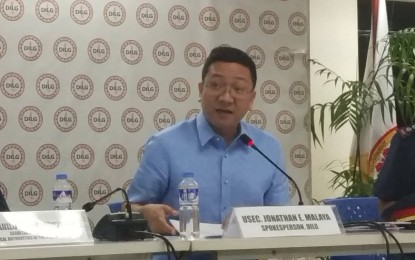
DILG spokesperson Undersecretary Jonathan Malaya. (File photo)
MANILA -- The Department of the Interior and Local Government (DILG) on Friday urged newly-elected local chief executives to participate in the Newly-Elected Officials (NEO) Program.
In a press conference on Friday, DILG Undersecretary and spokesperson Jonathan Malaya said Secretary Eduardo M. Año has issued Memorandum Circular 2019-96, directing all provincial governors, city/municipal mayors, Sanggunian members, and the Bangsamoro Autonomous Region in Muslim Mindanao (BARMM) governor to participate in the various capacity development initiatives under the 2019 NEO Program.
He said a total of 1,715 newly-elected local chief executives will undergo an orientation course on good local governance where they are expected to craft their First 100 Days Plan and Executive Agenda organized by the DILG this July.
For the first run of the course, all 81 provincial governors, all 145 city mayors, and 498 newly-minted or first-time municipal mayors will be prioritized, as the DILG prepares to conduct a separate refresher orientation for the reelected municipal mayors.
The schedule of the orientation course is as follows: July 8 to 10 for all Provincial Governors in Metro Manila; July 10 to 12 for all City Mayors in Metro Manila; July 16 to 18 for newly-minted Luzon municipal mayors of Regions 1, 3, and 4-A in Metro Manila; July 17 to19 for newly-minted municipal mayors in Regions II, CAR, MIMAROPA, and V in Metro Manila; July 24 to 26 for newly-minted Mindanao Municipal Mayors in Davao City; and July 29 to 31 for newly-minted Visayas Municipal Mayors in Cebu City.
The orientation course is part of the Jumpstarting Local Governance component of the Program for NEOs, a continuing intervention of the DILG through the Local Government Academy in its commitment to provide a harmonized and holistic capacity development delivery mechanism for local governments all over the country.
After the course, next in line for the NEOs are the training on Developing Executive-Legislative Relations and NEO Online: LGU Guide to Action.
Malaya said that the Orientation Course: Priming Leaders for Effective Governance (2019 Newly Elected Officials [NEO] program) aims to enhance the competencies of the newly-elected officials “in carrying out their new tasks as leaders in community development while promoting peace and resilience towards community development.”
“Much is expected from the incoming set of local officials especially at this time when local government units (LGUs) are counted upon to sustain and build upon the gains of President Rodrigo Duterte’s reform agenda now that he is midway into his term. Through this course, the DILG will therefore ensure that they are ready and equipped to hurdle the demands and challenges of local governance,” Malaya said.
Among the topics to be discussed are Duties, Responsibilities and Accountabilities of Elected Officials; Disaster Preparedness Protocols for LGUs; The Role of Leaders in Building Peaceful, Secure and Developed Communities, and in Advancing the Anti-Illegal Drugs Strategy; Retooled Community Support Program; Wielding Technology for the Enhancement of Local Governance; and Strategic Management.
“We have invited seasoned leaders as resource speakers like Congressman Edgar M. Chatto who was a three-term Governor of Bohol and Gov. Hadjiman S. Hataman-Salliman who made major breakthrough when Basilan and 22 other ARMM LGUs bagged the SGLG (Seal of Good Local governance) last year,” said Malaya. “They have a wealth of experiences that they can share to the first-timers and re-electionists for them to emulate and apply to their respective areas of jurisdiction.”
Other resource persons include National Security Adviser Hermogenes Esperon, Dangerous Drugs Board Chairperson Catalino Cuy, Undersecretary Ricardo Jalad of the Office of Civil Defense, Assistant Secretary Romell Antonio Cuenca of the Climate Change Commission and former DILG Undersecretary Austere Panadero, among others.
The course is composed of five modules, namely local governance and the evolving role of local leaders, building resilient local governments, leadership for peace and development, localizing the Philippine anti-illegal drugs strategy, solution-seeking sessions on key governance issues, and setting your governance in motion.
“If a Local Chief Executive wants to receive the DILG Seal of Good Local Governance (SGLG) for his LGU, the best way to start is to actively participate in the 2019 NEO Program,” said Malaya.
"This is a very important program. It will greatly help in good governance in the country. They don't have any reason not to come to Manila. There are funds available at the DILG to cover their accommodation. Funds in the LGUs can cover their transportation. I hope they take this DILG program seriously," he added. (PNA)
